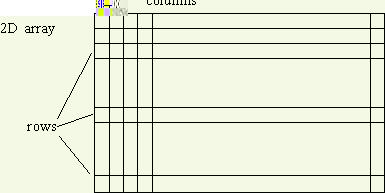int arr[max_size]; //search for value x in array i = 0; while (i< max_size && arr[i]!=x) //order is vital i++; if (i < max_size) cout << "Found at index: " << i; else cout << "Not in array";The short-circuit feature of the && is critical to the correctness of this code. If x is not in the array, i will eventually equal max_size and then in the evaluation of the && i< max_size is evaluated first, it will be False and thus arr[i]!=x will not be evaluated, which we wouldn't want because i is max_size and so arr[max_size] doesn't exist and would cause an error.

float mat[max_rows][max_cols]; //using global constants
//sum a row. Function with 2D array argument
cout << "Which row to sum: ";
cin >> row_num;
sum = sum_row(mat, row_num);
float sum_row (float M[][max_cols], int row) {
float sum=0;
int i;
for (i=0; i< max_cols; i++)
sum += M[row][i];
return sum;
}
----------------------------------------------------
Alternatively: function with 1D array of floats to sum
float sum_array (float V[]) {
float sum=0;
int i;
for (i=0; i< max_cols; i++)
sum += V[i];
return sum;
}
float mat[max_rows][max_cols]; //2D array
Calling this function with one row of a 2D array as the actual argument:
sum = sum_array(mat[row_num]);
Use this function to sum each row of the 2D array:
float sum[max_rows];
for (i=0; i< max_rows; i++)
sum[i] = sum_array(mat[i]);
Next (C strings)